Ethics Report: Analyzing Contractor & Subcontractor Legal Issues
VerifiedAdded on 2022/12/29
|9
|1717
|82
Report
AI Summary
This report examines the ethical dilemmas arising from legal disputes and miscommunications between contractors and subcontractors in the construction industry. It identifies problems such as contractual disagreements, inefficient project management, differing commitments, and cultural differences. The report analyzes these issues, emphasizing the importance of transparency and fairness in business operations. Recommendations for resolving these dilemmas include negotiations, expert determination, adjudication, and litigation. The report concludes that integrating the interests of contractors, subcontractors, the client, and the organization is crucial for resolving ethical dilemmas and ensuring project success. Desklib offers a platform to explore similar solved assignments and study tools for students.
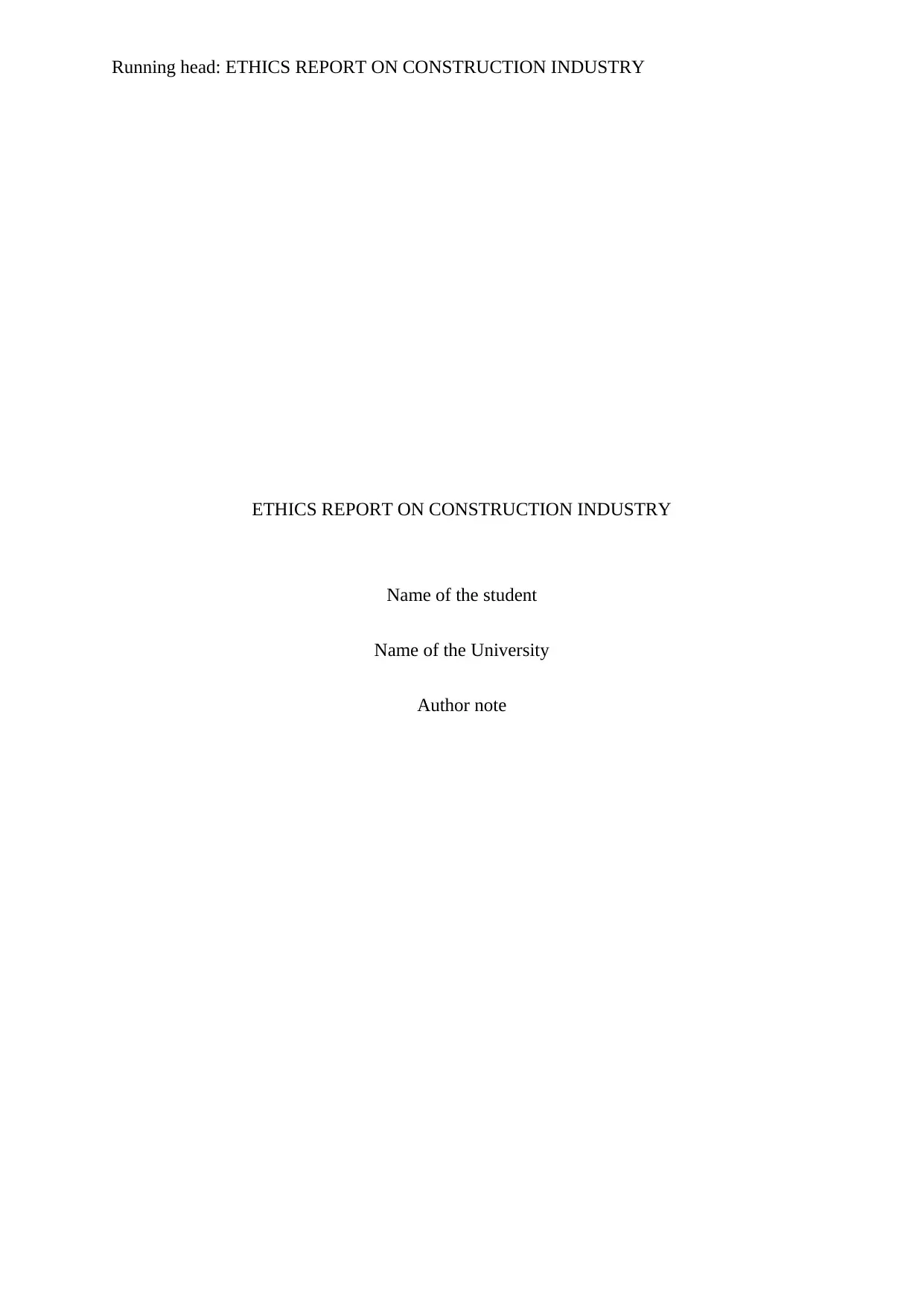
Running head: ETHICS REPORT ON CONSTRUCTION INDUSTRY
ETHICS REPORT ON CONSTRUCTION INDUSTRY
Name of the student
Name of the University
Author note
ETHICS REPORT ON CONSTRUCTION INDUSTRY
Name of the student
Name of the University
Author note
Paraphrase This Document
Need a fresh take? Get an instant paraphrase of this document with our AI Paraphraser
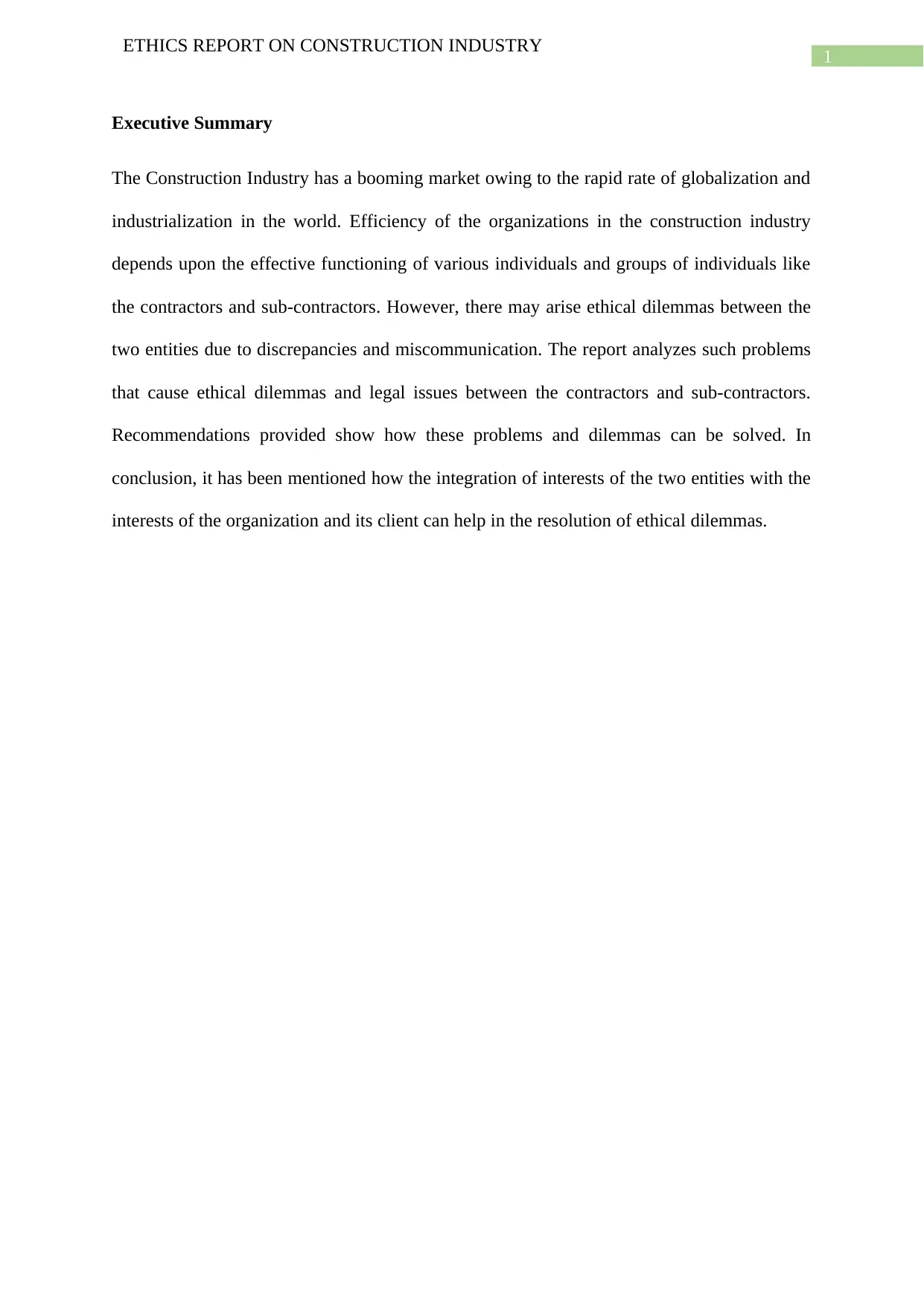
1
ETHICS REPORT ON CONSTRUCTION INDUSTRY
Executive Summary
The Construction Industry has a booming market owing to the rapid rate of globalization and
industrialization in the world. Efficiency of the organizations in the construction industry
depends upon the effective functioning of various individuals and groups of individuals like
the contractors and sub-contractors. However, there may arise ethical dilemmas between the
two entities due to discrepancies and miscommunication. The report analyzes such problems
that cause ethical dilemmas and legal issues between the contractors and sub-contractors.
Recommendations provided show how these problems and dilemmas can be solved. In
conclusion, it has been mentioned how the integration of interests of the two entities with the
interests of the organization and its client can help in the resolution of ethical dilemmas.
ETHICS REPORT ON CONSTRUCTION INDUSTRY
Executive Summary
The Construction Industry has a booming market owing to the rapid rate of globalization and
industrialization in the world. Efficiency of the organizations in the construction industry
depends upon the effective functioning of various individuals and groups of individuals like
the contractors and sub-contractors. However, there may arise ethical dilemmas between the
two entities due to discrepancies and miscommunication. The report analyzes such problems
that cause ethical dilemmas and legal issues between the contractors and sub-contractors.
Recommendations provided show how these problems and dilemmas can be solved. In
conclusion, it has been mentioned how the integration of interests of the two entities with the
interests of the organization and its client can help in the resolution of ethical dilemmas.
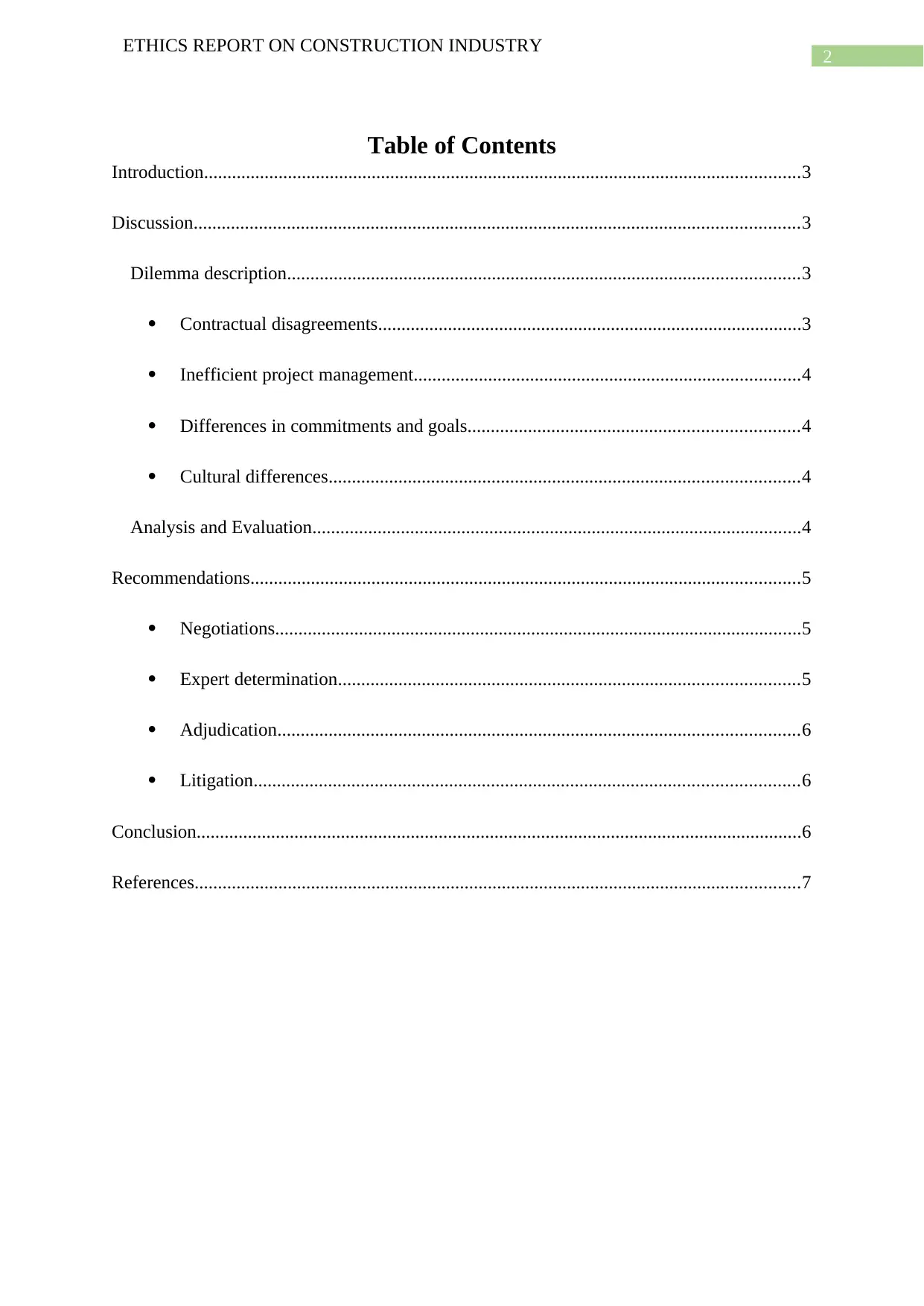
2
ETHICS REPORT ON CONSTRUCTION INDUSTRY
Table of Contents
Introduction................................................................................................................................3
Discussion..................................................................................................................................3
Dilemma description..............................................................................................................3
Contractual disagreements...........................................................................................3
Inefficient project management...................................................................................4
Differences in commitments and goals.......................................................................4
Cultural differences.....................................................................................................4
Analysis and Evaluation.........................................................................................................4
Recommendations......................................................................................................................5
Negotiations.................................................................................................................5
Expert determination...................................................................................................5
Adjudication................................................................................................................6
Litigation.....................................................................................................................6
Conclusion..................................................................................................................................6
References..................................................................................................................................7
ETHICS REPORT ON CONSTRUCTION INDUSTRY
Table of Contents
Introduction................................................................................................................................3
Discussion..................................................................................................................................3
Dilemma description..............................................................................................................3
Contractual disagreements...........................................................................................3
Inefficient project management...................................................................................4
Differences in commitments and goals.......................................................................4
Cultural differences.....................................................................................................4
Analysis and Evaluation.........................................................................................................4
Recommendations......................................................................................................................5
Negotiations.................................................................................................................5
Expert determination...................................................................................................5
Adjudication................................................................................................................6
Litigation.....................................................................................................................6
Conclusion..................................................................................................................................6
References..................................................................................................................................7
⊘ This is a preview!⊘
Do you want full access?
Subscribe today to unlock all pages.

Trusted by 1+ million students worldwide
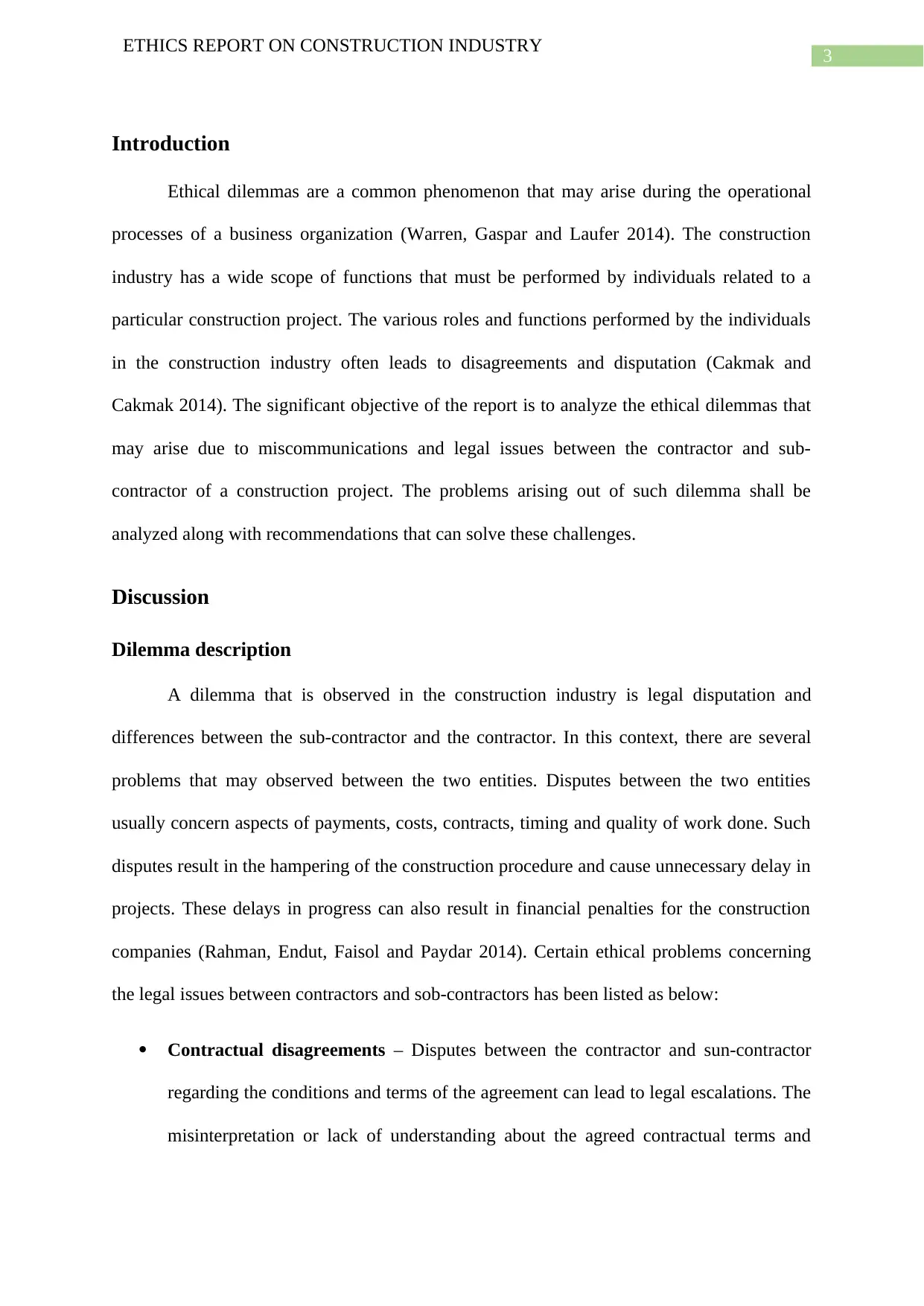
3
ETHICS REPORT ON CONSTRUCTION INDUSTRY
Introduction
Ethical dilemmas are a common phenomenon that may arise during the operational
processes of a business organization (Warren, Gaspar and Laufer 2014). The construction
industry has a wide scope of functions that must be performed by individuals related to a
particular construction project. The various roles and functions performed by the individuals
in the construction industry often leads to disagreements and disputation (Cakmak and
Cakmak 2014). The significant objective of the report is to analyze the ethical dilemmas that
may arise due to miscommunications and legal issues between the contractor and sub-
contractor of a construction project. The problems arising out of such dilemma shall be
analyzed along with recommendations that can solve these challenges.
Discussion
Dilemma description
A dilemma that is observed in the construction industry is legal disputation and
differences between the sub-contractor and the contractor. In this context, there are several
problems that may observed between the two entities. Disputes between the two entities
usually concern aspects of payments, costs, contracts, timing and quality of work done. Such
disputes result in the hampering of the construction procedure and cause unnecessary delay in
projects. These delays in progress can also result in financial penalties for the construction
companies (Rahman, Endut, Faisol and Paydar 2014). Certain ethical problems concerning
the legal issues between contractors and sob-contractors has been listed as below:
Contractual disagreements – Disputes between the contractor and sun-contractor
regarding the conditions and terms of the agreement can lead to legal escalations. The
misinterpretation or lack of understanding about the agreed contractual terms and
ETHICS REPORT ON CONSTRUCTION INDUSTRY
Introduction
Ethical dilemmas are a common phenomenon that may arise during the operational
processes of a business organization (Warren, Gaspar and Laufer 2014). The construction
industry has a wide scope of functions that must be performed by individuals related to a
particular construction project. The various roles and functions performed by the individuals
in the construction industry often leads to disagreements and disputation (Cakmak and
Cakmak 2014). The significant objective of the report is to analyze the ethical dilemmas that
may arise due to miscommunications and legal issues between the contractor and sub-
contractor of a construction project. The problems arising out of such dilemma shall be
analyzed along with recommendations that can solve these challenges.
Discussion
Dilemma description
A dilemma that is observed in the construction industry is legal disputation and
differences between the sub-contractor and the contractor. In this context, there are several
problems that may observed between the two entities. Disputes between the two entities
usually concern aspects of payments, costs, contracts, timing and quality of work done. Such
disputes result in the hampering of the construction procedure and cause unnecessary delay in
projects. These delays in progress can also result in financial penalties for the construction
companies (Rahman, Endut, Faisol and Paydar 2014). Certain ethical problems concerning
the legal issues between contractors and sob-contractors has been listed as below:
Contractual disagreements – Disputes between the contractor and sun-contractor
regarding the conditions and terms of the agreement can lead to legal escalations. The
misinterpretation or lack of understanding about the agreed contractual terms and
Paraphrase This Document
Need a fresh take? Get an instant paraphrase of this document with our AI Paraphraser
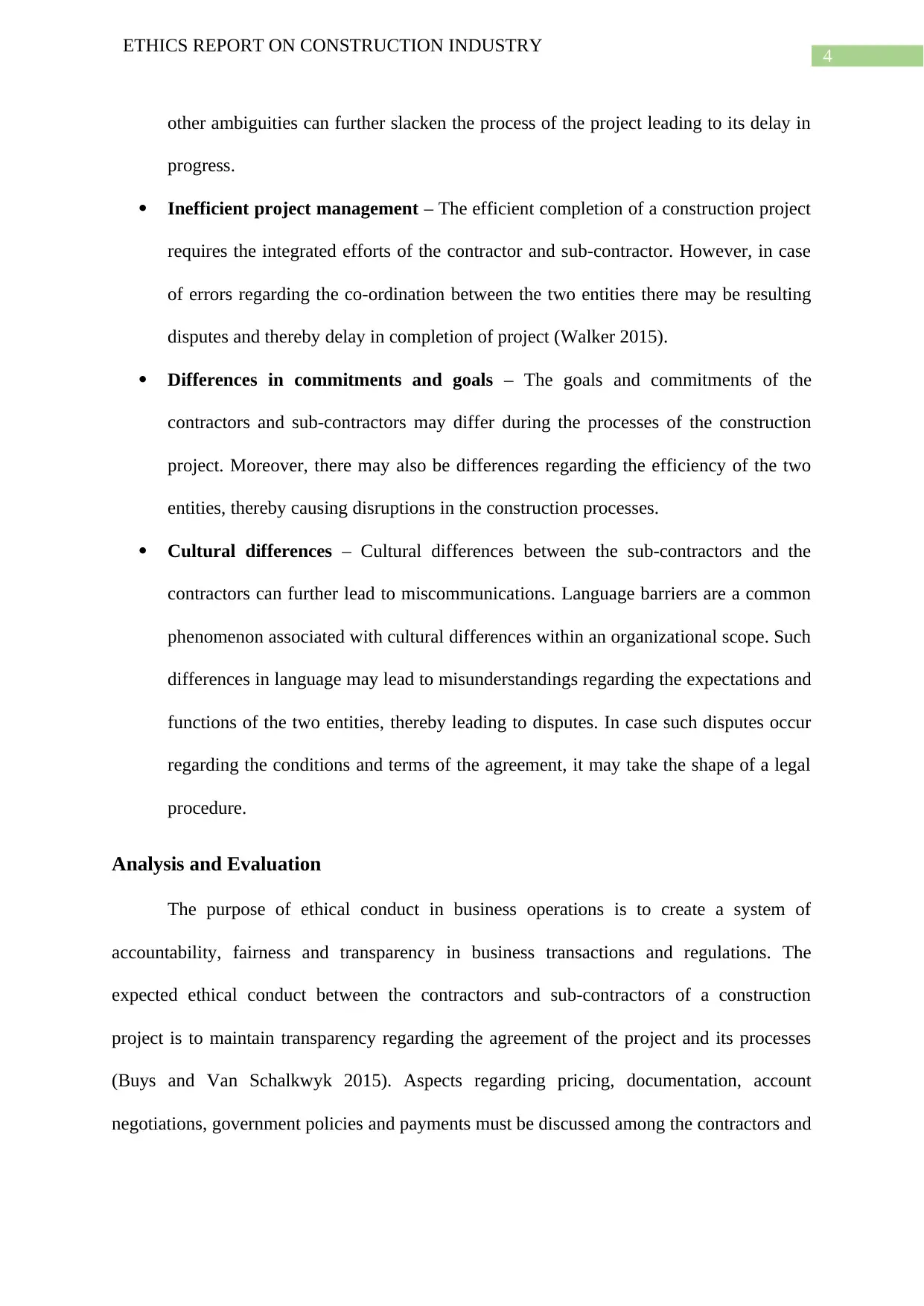
4
ETHICS REPORT ON CONSTRUCTION INDUSTRY
other ambiguities can further slacken the process of the project leading to its delay in
progress.
Inefficient project management – The efficient completion of a construction project
requires the integrated efforts of the contractor and sub-contractor. However, in case
of errors regarding the co-ordination between the two entities there may be resulting
disputes and thereby delay in completion of project (Walker 2015).
Differences in commitments and goals – The goals and commitments of the
contractors and sub-contractors may differ during the processes of the construction
project. Moreover, there may also be differences regarding the efficiency of the two
entities, thereby causing disruptions in the construction processes.
Cultural differences – Cultural differences between the sub-contractors and the
contractors can further lead to miscommunications. Language barriers are a common
phenomenon associated with cultural differences within an organizational scope. Such
differences in language may lead to misunderstandings regarding the expectations and
functions of the two entities, thereby leading to disputes. In case such disputes occur
regarding the conditions and terms of the agreement, it may take the shape of a legal
procedure.
Analysis and Evaluation
The purpose of ethical conduct in business operations is to create a system of
accountability, fairness and transparency in business transactions and regulations. The
expected ethical conduct between the contractors and sub-contractors of a construction
project is to maintain transparency regarding the agreement of the project and its processes
(Buys and Van Schalkwyk 2015). Aspects regarding pricing, documentation, account
negotiations, government policies and payments must be discussed among the contractors and
ETHICS REPORT ON CONSTRUCTION INDUSTRY
other ambiguities can further slacken the process of the project leading to its delay in
progress.
Inefficient project management – The efficient completion of a construction project
requires the integrated efforts of the contractor and sub-contractor. However, in case
of errors regarding the co-ordination between the two entities there may be resulting
disputes and thereby delay in completion of project (Walker 2015).
Differences in commitments and goals – The goals and commitments of the
contractors and sub-contractors may differ during the processes of the construction
project. Moreover, there may also be differences regarding the efficiency of the two
entities, thereby causing disruptions in the construction processes.
Cultural differences – Cultural differences between the sub-contractors and the
contractors can further lead to miscommunications. Language barriers are a common
phenomenon associated with cultural differences within an organizational scope. Such
differences in language may lead to misunderstandings regarding the expectations and
functions of the two entities, thereby leading to disputes. In case such disputes occur
regarding the conditions and terms of the agreement, it may take the shape of a legal
procedure.
Analysis and Evaluation
The purpose of ethical conduct in business operations is to create a system of
accountability, fairness and transparency in business transactions and regulations. The
expected ethical conduct between the contractors and sub-contractors of a construction
project is to maintain transparency regarding the agreement of the project and its processes
(Buys and Van Schalkwyk 2015). Aspects regarding pricing, documentation, account
negotiations, government policies and payments must be discussed among the contractors and
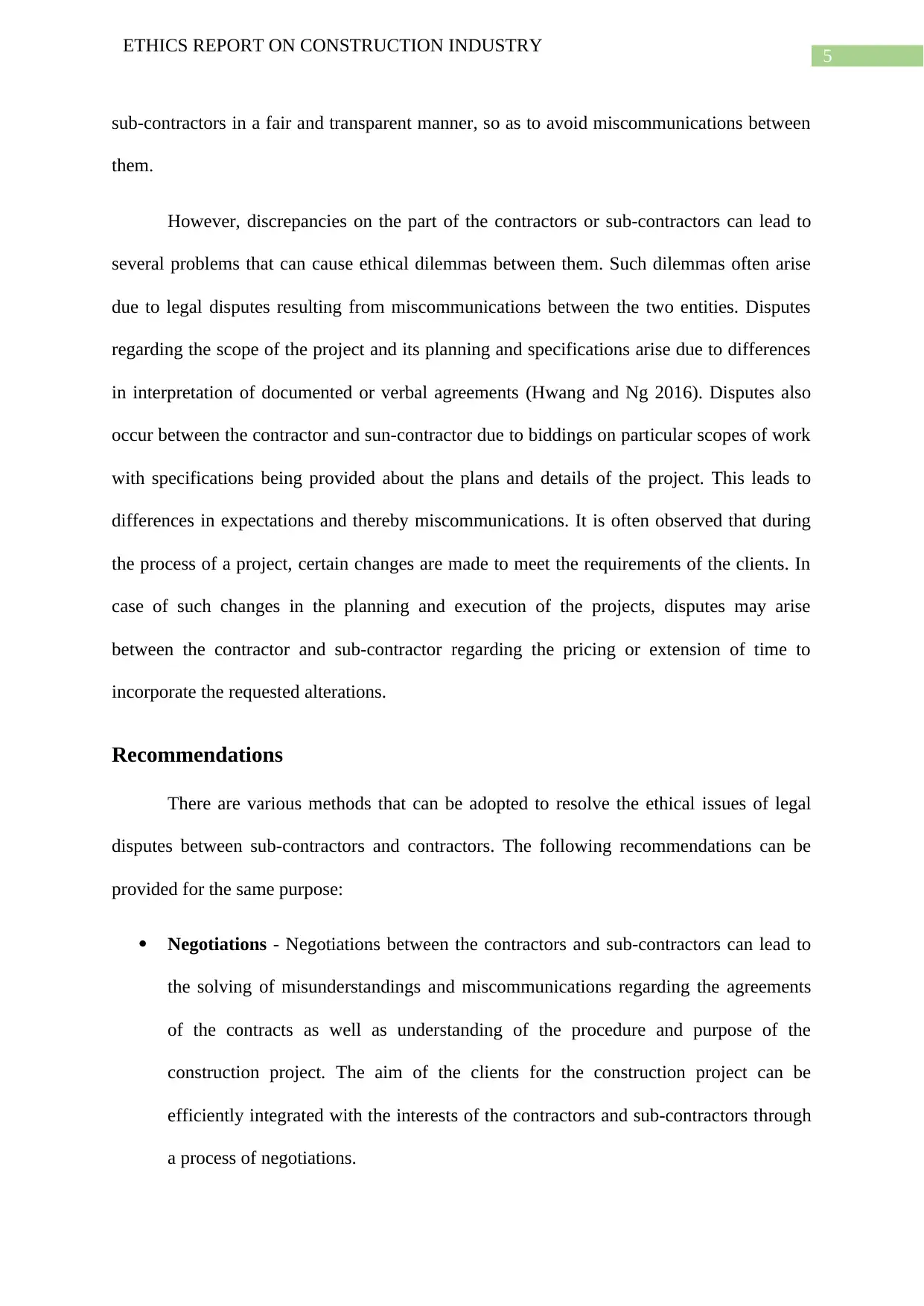
5
ETHICS REPORT ON CONSTRUCTION INDUSTRY
sub-contractors in a fair and transparent manner, so as to avoid miscommunications between
them.
However, discrepancies on the part of the contractors or sub-contractors can lead to
several problems that can cause ethical dilemmas between them. Such dilemmas often arise
due to legal disputes resulting from miscommunications between the two entities. Disputes
regarding the scope of the project and its planning and specifications arise due to differences
in interpretation of documented or verbal agreements (Hwang and Ng 2016). Disputes also
occur between the contractor and sun-contractor due to biddings on particular scopes of work
with specifications being provided about the plans and details of the project. This leads to
differences in expectations and thereby miscommunications. It is often observed that during
the process of a project, certain changes are made to meet the requirements of the clients. In
case of such changes in the planning and execution of the projects, disputes may arise
between the contractor and sub-contractor regarding the pricing or extension of time to
incorporate the requested alterations.
Recommendations
There are various methods that can be adopted to resolve the ethical issues of legal
disputes between sub-contractors and contractors. The following recommendations can be
provided for the same purpose:
Negotiations - Negotiations between the contractors and sub-contractors can lead to
the solving of misunderstandings and miscommunications regarding the agreements
of the contracts as well as understanding of the procedure and purpose of the
construction project. The aim of the clients for the construction project can be
efficiently integrated with the interests of the contractors and sub-contractors through
a process of negotiations.
ETHICS REPORT ON CONSTRUCTION INDUSTRY
sub-contractors in a fair and transparent manner, so as to avoid miscommunications between
them.
However, discrepancies on the part of the contractors or sub-contractors can lead to
several problems that can cause ethical dilemmas between them. Such dilemmas often arise
due to legal disputes resulting from miscommunications between the two entities. Disputes
regarding the scope of the project and its planning and specifications arise due to differences
in interpretation of documented or verbal agreements (Hwang and Ng 2016). Disputes also
occur between the contractor and sun-contractor due to biddings on particular scopes of work
with specifications being provided about the plans and details of the project. This leads to
differences in expectations and thereby miscommunications. It is often observed that during
the process of a project, certain changes are made to meet the requirements of the clients. In
case of such changes in the planning and execution of the projects, disputes may arise
between the contractor and sub-contractor regarding the pricing or extension of time to
incorporate the requested alterations.
Recommendations
There are various methods that can be adopted to resolve the ethical issues of legal
disputes between sub-contractors and contractors. The following recommendations can be
provided for the same purpose:
Negotiations - Negotiations between the contractors and sub-contractors can lead to
the solving of misunderstandings and miscommunications regarding the agreements
of the contracts as well as understanding of the procedure and purpose of the
construction project. The aim of the clients for the construction project can be
efficiently integrated with the interests of the contractors and sub-contractors through
a process of negotiations.
⊘ This is a preview!⊘
Do you want full access?
Subscribe today to unlock all pages.

Trusted by 1+ million students worldwide
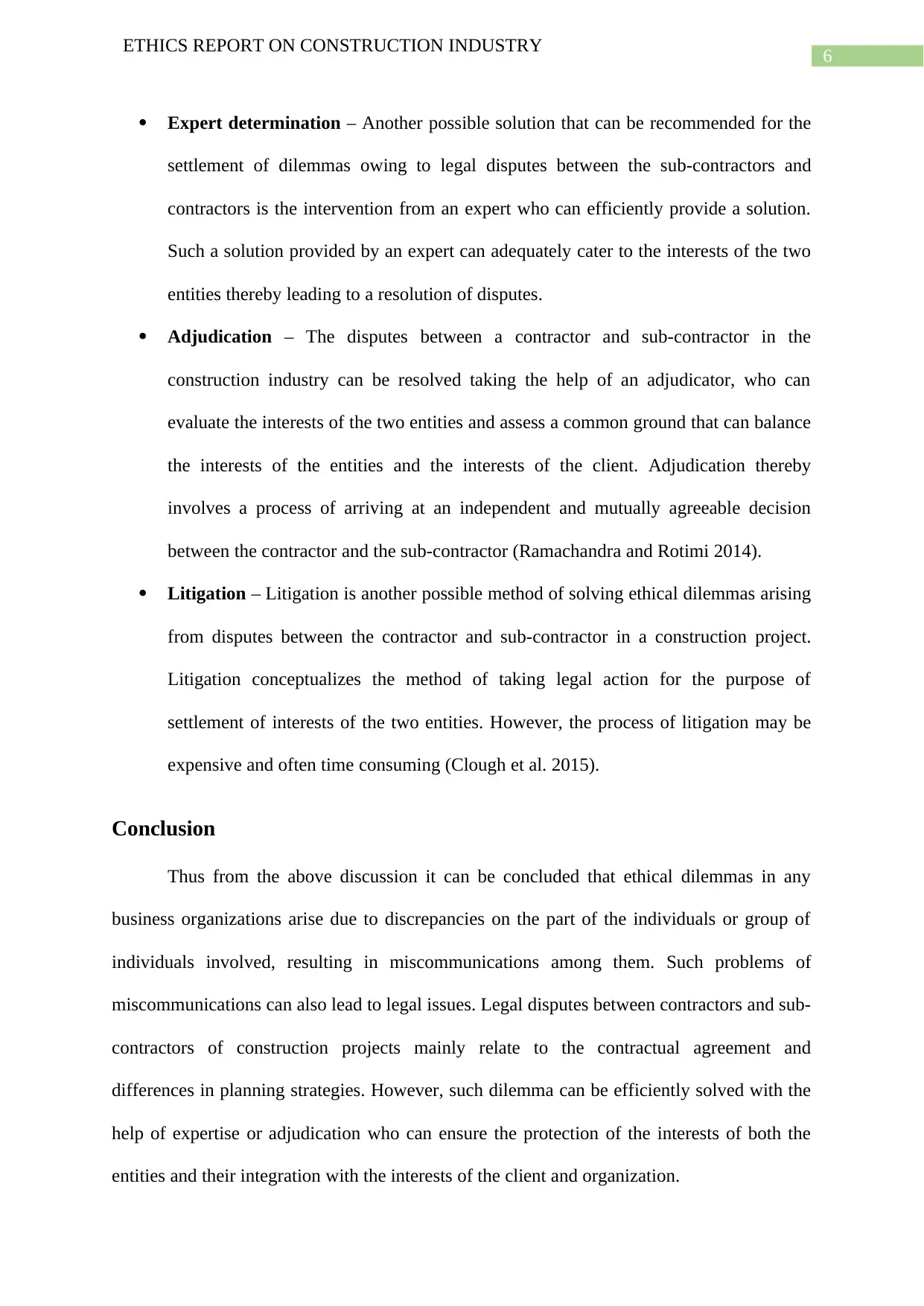
6
ETHICS REPORT ON CONSTRUCTION INDUSTRY
Expert determination – Another possible solution that can be recommended for the
settlement of dilemmas owing to legal disputes between the sub-contractors and
contractors is the intervention from an expert who can efficiently provide a solution.
Such a solution provided by an expert can adequately cater to the interests of the two
entities thereby leading to a resolution of disputes.
Adjudication – The disputes between a contractor and sub-contractor in the
construction industry can be resolved taking the help of an adjudicator, who can
evaluate the interests of the two entities and assess a common ground that can balance
the interests of the entities and the interests of the client. Adjudication thereby
involves a process of arriving at an independent and mutually agreeable decision
between the contractor and the sub-contractor (Ramachandra and Rotimi 2014).
Litigation – Litigation is another possible method of solving ethical dilemmas arising
from disputes between the contractor and sub-contractor in a construction project.
Litigation conceptualizes the method of taking legal action for the purpose of
settlement of interests of the two entities. However, the process of litigation may be
expensive and often time consuming (Clough et al. 2015).
Conclusion
Thus from the above discussion it can be concluded that ethical dilemmas in any
business organizations arise due to discrepancies on the part of the individuals or group of
individuals involved, resulting in miscommunications among them. Such problems of
miscommunications can also lead to legal issues. Legal disputes between contractors and sub-
contractors of construction projects mainly relate to the contractual agreement and
differences in planning strategies. However, such dilemma can be efficiently solved with the
help of expertise or adjudication who can ensure the protection of the interests of both the
entities and their integration with the interests of the client and organization.
ETHICS REPORT ON CONSTRUCTION INDUSTRY
Expert determination – Another possible solution that can be recommended for the
settlement of dilemmas owing to legal disputes between the sub-contractors and
contractors is the intervention from an expert who can efficiently provide a solution.
Such a solution provided by an expert can adequately cater to the interests of the two
entities thereby leading to a resolution of disputes.
Adjudication – The disputes between a contractor and sub-contractor in the
construction industry can be resolved taking the help of an adjudicator, who can
evaluate the interests of the two entities and assess a common ground that can balance
the interests of the entities and the interests of the client. Adjudication thereby
involves a process of arriving at an independent and mutually agreeable decision
between the contractor and the sub-contractor (Ramachandra and Rotimi 2014).
Litigation – Litigation is another possible method of solving ethical dilemmas arising
from disputes between the contractor and sub-contractor in a construction project.
Litigation conceptualizes the method of taking legal action for the purpose of
settlement of interests of the two entities. However, the process of litigation may be
expensive and often time consuming (Clough et al. 2015).
Conclusion
Thus from the above discussion it can be concluded that ethical dilemmas in any
business organizations arise due to discrepancies on the part of the individuals or group of
individuals involved, resulting in miscommunications among them. Such problems of
miscommunications can also lead to legal issues. Legal disputes between contractors and sub-
contractors of construction projects mainly relate to the contractual agreement and
differences in planning strategies. However, such dilemma can be efficiently solved with the
help of expertise or adjudication who can ensure the protection of the interests of both the
entities and their integration with the interests of the client and organization.
Paraphrase This Document
Need a fresh take? Get an instant paraphrase of this document with our AI Paraphraser
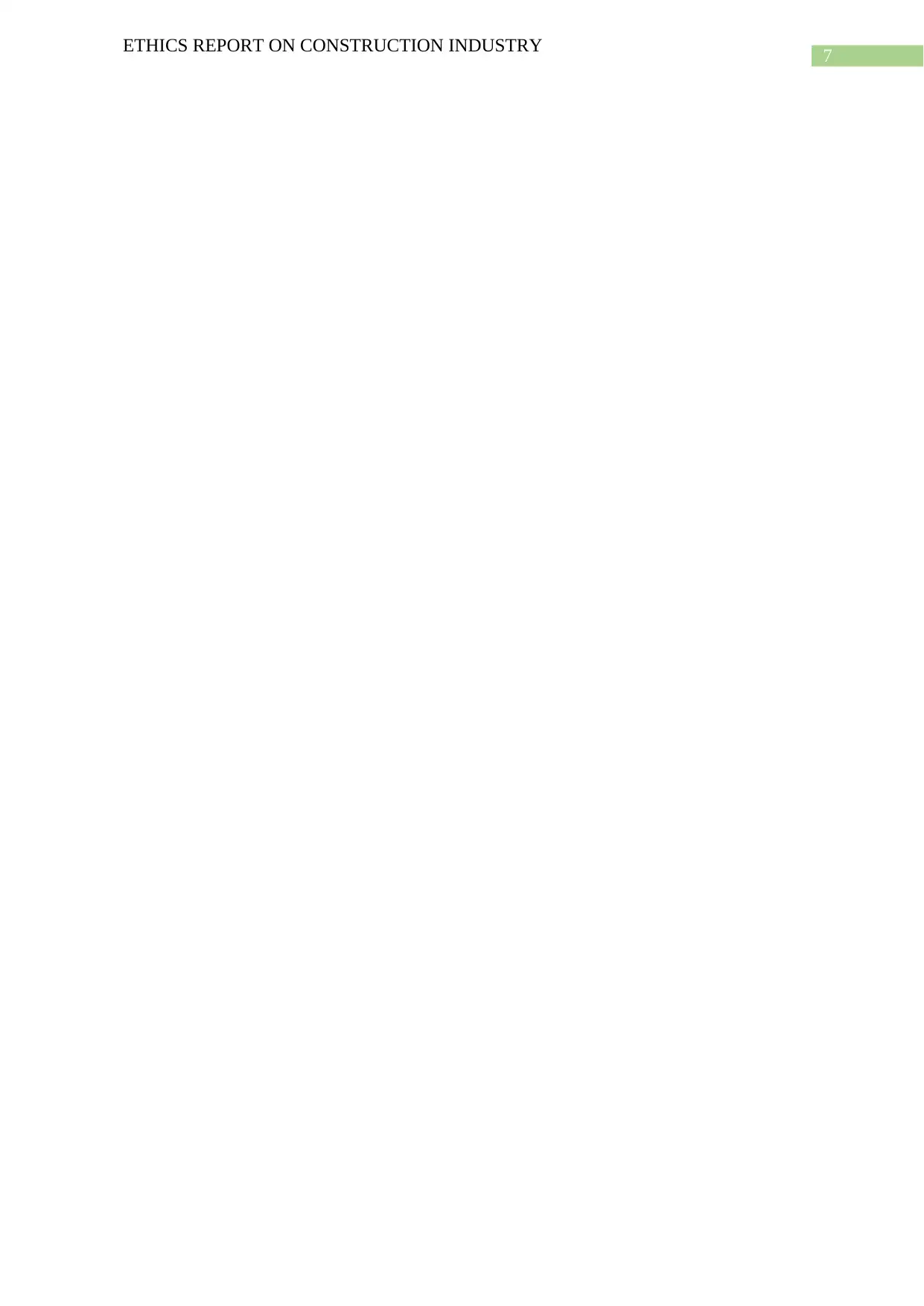
7
ETHICS REPORT ON CONSTRUCTION INDUSTRY
ETHICS REPORT ON CONSTRUCTION INDUSTRY
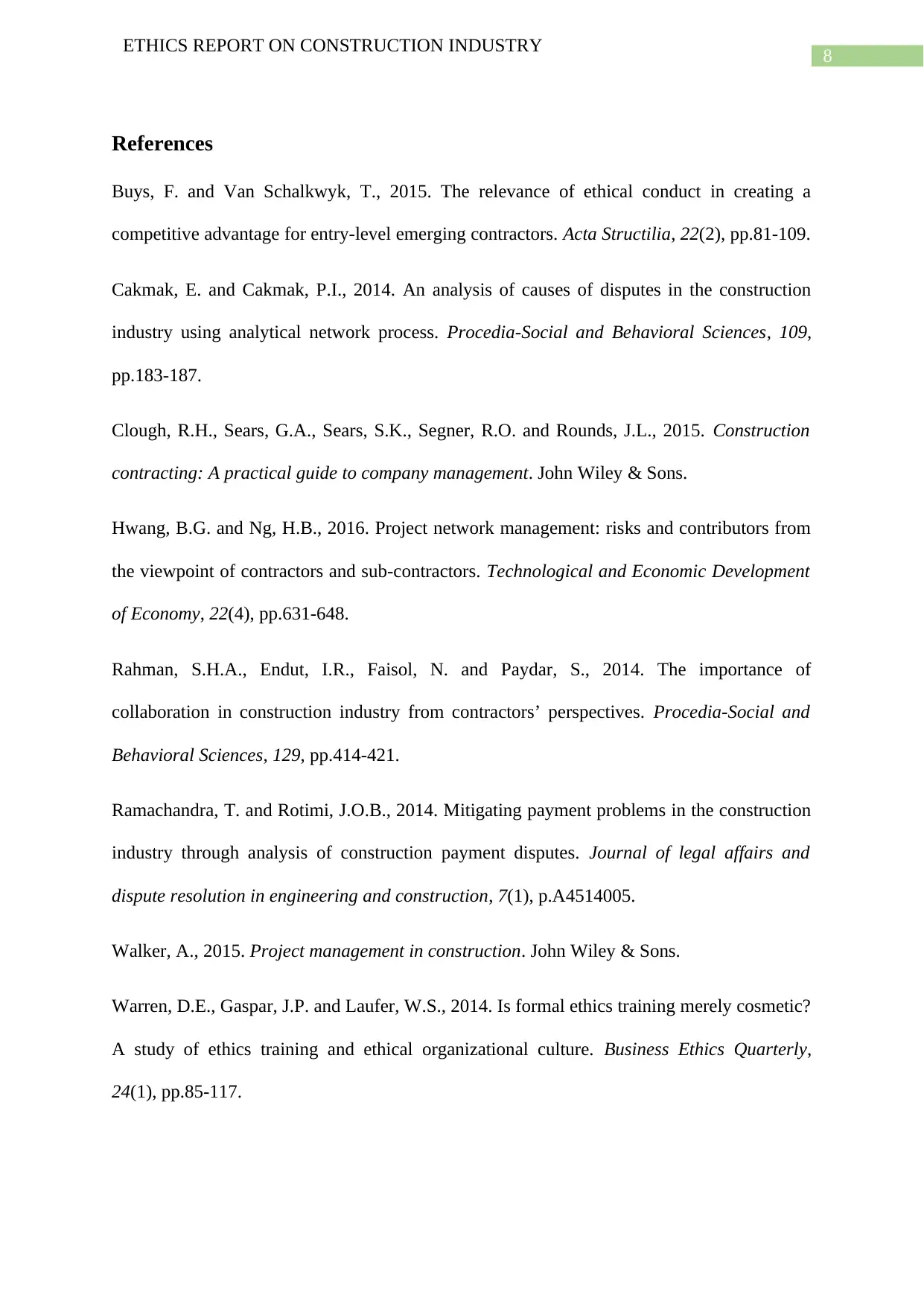
8
ETHICS REPORT ON CONSTRUCTION INDUSTRY
References
Buys, F. and Van Schalkwyk, T., 2015. The relevance of ethical conduct in creating a
competitive advantage for entry-level emerging contractors. Acta Structilia, 22(2), pp.81-109.
Cakmak, E. and Cakmak, P.I., 2014. An analysis of causes of disputes in the construction
industry using analytical network process. Procedia-Social and Behavioral Sciences, 109,
pp.183-187.
Clough, R.H., Sears, G.A., Sears, S.K., Segner, R.O. and Rounds, J.L., 2015. Construction
contracting: A practical guide to company management. John Wiley & Sons.
Hwang, B.G. and Ng, H.B., 2016. Project network management: risks and contributors from
the viewpoint of contractors and sub-contractors. Technological and Economic Development
of Economy, 22(4), pp.631-648.
Rahman, S.H.A., Endut, I.R., Faisol, N. and Paydar, S., 2014. The importance of
collaboration in construction industry from contractors’ perspectives. Procedia-Social and
Behavioral Sciences, 129, pp.414-421.
Ramachandra, T. and Rotimi, J.O.B., 2014. Mitigating payment problems in the construction
industry through analysis of construction payment disputes. Journal of legal affairs and
dispute resolution in engineering and construction, 7(1), p.A4514005.
Walker, A., 2015. Project management in construction. John Wiley & Sons.
Warren, D.E., Gaspar, J.P. and Laufer, W.S., 2014. Is formal ethics training merely cosmetic?
A study of ethics training and ethical organizational culture. Business Ethics Quarterly,
24(1), pp.85-117.
ETHICS REPORT ON CONSTRUCTION INDUSTRY
References
Buys, F. and Van Schalkwyk, T., 2015. The relevance of ethical conduct in creating a
competitive advantage for entry-level emerging contractors. Acta Structilia, 22(2), pp.81-109.
Cakmak, E. and Cakmak, P.I., 2014. An analysis of causes of disputes in the construction
industry using analytical network process. Procedia-Social and Behavioral Sciences, 109,
pp.183-187.
Clough, R.H., Sears, G.A., Sears, S.K., Segner, R.O. and Rounds, J.L., 2015. Construction
contracting: A practical guide to company management. John Wiley & Sons.
Hwang, B.G. and Ng, H.B., 2016. Project network management: risks and contributors from
the viewpoint of contractors and sub-contractors. Technological and Economic Development
of Economy, 22(4), pp.631-648.
Rahman, S.H.A., Endut, I.R., Faisol, N. and Paydar, S., 2014. The importance of
collaboration in construction industry from contractors’ perspectives. Procedia-Social and
Behavioral Sciences, 129, pp.414-421.
Ramachandra, T. and Rotimi, J.O.B., 2014. Mitigating payment problems in the construction
industry through analysis of construction payment disputes. Journal of legal affairs and
dispute resolution in engineering and construction, 7(1), p.A4514005.
Walker, A., 2015. Project management in construction. John Wiley & Sons.
Warren, D.E., Gaspar, J.P. and Laufer, W.S., 2014. Is formal ethics training merely cosmetic?
A study of ethics training and ethical organizational culture. Business Ethics Quarterly,
24(1), pp.85-117.
⊘ This is a preview!⊘
Do you want full access?
Subscribe today to unlock all pages.

Trusted by 1+ million students worldwide
1 out of 9
Related Documents
Your All-in-One AI-Powered Toolkit for Academic Success.
+13062052269
info@desklib.com
Available 24*7 on WhatsApp / Email
![[object Object]](/_next/static/media/star-bottom.7253800d.svg)
Unlock your academic potential
Copyright © 2020–2026 A2Z Services. All Rights Reserved. Developed and managed by ZUCOL.




